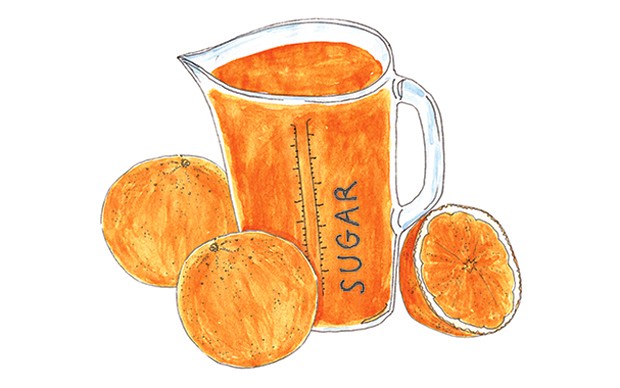Fruit juice is perceived often as healthy. It is understandable, given that it is natural and has the word “fruit” in it. However, many people do not realize that the fruit juice contains sugar. In fact, it has sugar and calories as much as a cold drink with sugar and sometimes even more . The small amount of vitamins and antioxidants in juice doesn’t compensate the large amount of sugar.
Fruit juice is not always what it seems
Unfortunately, manufacturers of food and drink are not always honest about their products. Fruit juice that you find at the supermarket may not be what you think it is, even if the label says it is “100% pure” and ” is not made from concentrate juice ”.
After squeeze it from fruits, the juice is usually stored in massive tanks that was brought out the oxygen to be kept under these conditions a year before being packed. The main problem with this way is that it tends to remove most of the aroma, so that manufacturers need to add the so-called “aroma pack” to bring back the aroma that is lost during processing.
[adsenseyu1]
So even if we buy the best quality juices from the supermarket, they are far from their original state. Some of the juices of poor quality have nothing of freshly squeezed juice, being actually fresh water with fruit flavors.
Conclusion: fruit juice is not always what it seems. Even quality juices passed through the processing methods which have removed flavor, being necessary to add so-called “flavor pack” to bring them back to their original state.
Fruit juice contains vitamins, minerals and antioxidants, but lacks fiber and is full of sugar
Fruit juice hasn’t many things that whole healthy fruits contain. Orange juice, for example, contains vitamin C and is a good source of folic acid, potassium, vitamin B1 . It also contains anti-oxidants, and some of which can increase blood antioxidant value . However, nutritional drinks are nutritive poor compared to whole fruits and other plants, such as vegetables . The major problem is that fruit juice does not contain fiber and has a lot of sugar.
Take a look at the content of a serving of 350 ml. of Coca Cola and an apple juice:
• Coca Cola: 140 calories and 40 grams. sugar (10 teaspoons).
• Apple juice: 165 calories and 39 grams. sugar (9.8 teaspoons).
This is the ugly truth about fruit juices: Most juices contain a similar amount of sugar like drinks sweetened with sugar, sometimes having more calories!
Conclusion: fruit juice contains some nutrients, but less compared to many plants. Doesn’t have fiber, has as much sugar and calories as sugar sweetened beverages.
[adsenseyu1]
It is easy to consume large amounts of sugar from fruit juice
When we eat a fruit we make a serious effort to chew and swallow it. Fruit sugar is bound in fibrous structures that break down slowly during digestion. The fruits are nourishing, so it’s hard to eat a large amount. Therefore, the sugar from whole fruit is sent to the liver slowly and in small quantities. The liver can metabolize easily these small amounts without being overloaded. But if we drink a glass of fruit juice, it is equivalent to eating more fruit in a very short time and without the benefit of fiber. The large amount of sugar is absorbed and sent to the liver very quickly, like when drinking a sugar-sweetened beverage.
Much of sugar that is found in fruits is fructose. The liver is the only organ that can metabolize fructose in large quantities . When the liver receives more fructose than can manage, a part of it is converted into fat. A certain amount of the grease deposite in the liver and contribute to the accumulation of adipose cells and insulin resistance .
Although small amounts of fruit juice (or cold drinks) is unlikely to cause major problems for thin people, assets, this can be a disaster for those who are overweight or diet-related metabolic disorders . Sugar metabolic studies show that liquid sugar can cause insulin resistance, increase triglycerides, low cholesterol, dense LDL, oxidized LDL and can lead to accumulation of fat in abdomen in less than 10 weeks . Although most studies use sweetened beverages with sugar or fructose, there is no reason to believe that 100% fruit juice would be different. Sugar molecules are identical and our liver can not make the difference.
If in doubt, some studies have used real fruit juice. In one, 480 ml. grape juice daily for three months caused insulin resistance and increasing the waist circumference in individuals who are overweight . In another study, eating two or more servings of fruit juice per day was associated with double the risk of gout in women .
Conclusion: fruit juice contain a large amount of sugar, fiber free and chewing resistance to limit the amount. Studies show that this can lead to significant metabolic problems and serious disease.
Liquid calories fatten us a lot
It is a myth that all calories are created equally. Different foods pass through different pathways and have different effects on hunger, hormones and the brain centers that control body weight . The brain is responsible for regulating energy balance. When we add a food in our diet, our brain “compensates” making us eat less of other foods . For example, if we begin to eat two boiled potatoes every day, subconsciously we will consume less of other foods, so that total calories will not increase much in total.
Well, it appears that liquid calories do not really work the same way as the calories that come from solid foods. When people add liquid calories in the diet, such as apple juice, they do not compensate by eating less of other foods . This is one of the reasons that sweet drinks are among the foods that fatten us most.
They don’t contribute to satiety, but makes us eat more .
A study made on children shows that the risk of obesity increased by 60% for each daily serving of sugar-sweetened beverage . There is no reason to believe that fruit juice should have a different effect to sugary drinks, if consumed in the same quantities. Several studies have shown that the fruit juice is associated with an increased risk of obesity and type 2 diabetes, while the whole fruits are associated with a reduced risk .
Eat whole fruits, but avoid juice – is not healthy
Nutritionists often recommend fruit juice instead of five servings of fruits and vegetables per day. I think it is a huge mistake because it sends the message that fruit juice is healthy and a good source of nutrients. Most people consume too much sugar and reducing sugar intake is more important than getting a small amount of nutrients found in fruit juice.
Instead of fruit juice eat whole fruits . In this way, you get fiber, antioxidants, vitamins and minerals that are found naturally in fruits. In general, the consumption of fruit juice in small amounts can be good for some people, but people should realize that fruit juices are very similar to sweetened cold drinks.
Very important is that our liver can not make the difference. All the harmful effects of sugar-sweetened beverages are available for fruit juices too.








